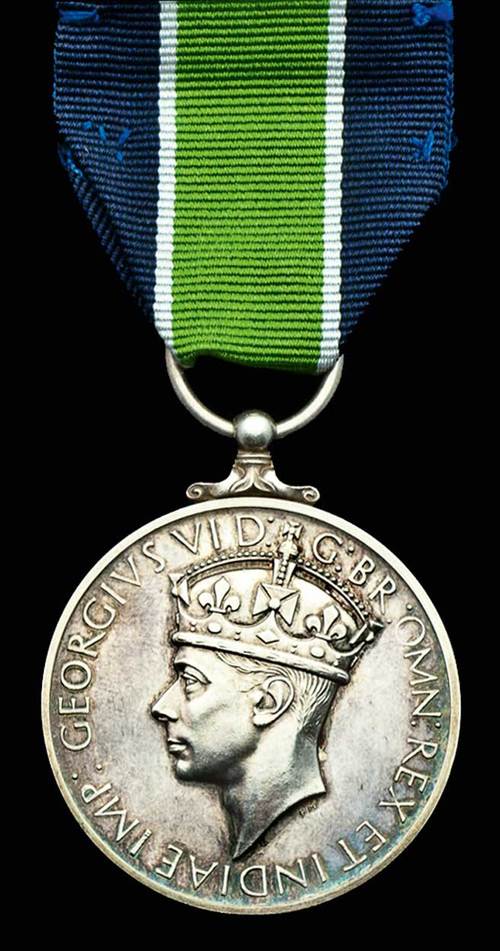
Auction: 323 - The Numismatic Collector's Series Sale
Lot: 766
A Colonial Police L.S. & G.C. to Inspector Arthur Stopher, Ceylon Police, Late Royal Welsh Fusiliers, Royal Flying Corps, and the Auxiliary Division, Royal Irish Constabulary
Colonial Police Long Service & G.C., G.VI.R. (Inspr. A. C. Stopher), extremely fine, in Royal Mint case of issue
Inspector Arthur Cecil Stopher was born in Charlton, London in January 1898. Commissioned Second Lieutenant in the Royal Welsh Fusiliers, 28.10.1915, he served with the 2nd Battalion during the Great War in the Egyptian theatre of war from 16.3.1916. Transferred to the General List, 10.11.1916, he was subsequently posted as a Lieutenant in the Royal Flying Corps. Serving in the Balkans with No. 47 Squadron, he was forced to land his Armstrong Whitworth FK3 aircraft behind enemy lines at Demir Hisoda, 12.2.1917; taken prisoner of war, his captured aircraft is believed to have been used by Bulgarian forces for 42 night bombing raids until it was shot up and forced to land, 23.3.1918. Held at the Bulgarian prison camp at Philippopolis (modern day Plovdiv), another British pilot shot down over Turkish lines housed there wrote about the experience: 'The officers lived in a former cholera hospital with a concrete floor and a sheet-iron roof, which leaked until it was blown off in a sandstorm and never replaced. The walls were coated with mud and chopped straw, ideal conditions for vermin. The facility lacked furniture, crockery, and washing accommodations; individual P.O.W.s constructed their own furniture and partitions by purchasing construction material in town at exorbitant prices. Daily rations were limited to three hundred grams of black bread and pepper-pods, egg-fruit (an egg-shaped orange-yellow sweet fruit), rice-mill siftings, or cabbage, an inadequate diet upon which to survive. P.O.W.s became dependent on food parcels from home, and officers formed messes through which they pooled food and spare clothing. Some food could be purchased in town at prohibitive prices including sugar, butter, flour, chickens, potatoes, eggs, apples, plums, tea, coffee, cocoa, and scarce soap. Fuel-charcoal and wood-was among the largest expenses, and lighting was very difficult because oil was unavailable. A used suit of clothes in poor condition cost £50.'
Released from captivity at the end of the War, Stopher was appointed a Temporary Cadet in the Auxiliary Division of the Royal Irish Constabulary, 30.7.1920, with service number 72168, and was posted to 'A' Company. Promoted Section Leader, 9.12.1920, and Platoon Commander, 21.2.1921, he was discharged on the disbandment of the A.D.R.I.C. in January 1922. In March of that year he joined the British Gendarmerie section of the Palestine Police (as indeed did many former members of the Auxiliary Division) as a Sergeant, before transferring to the Ceylon Police. Advanced Inspector, he was awarded his Colonial Police L.S. & G.C. whilst serving with the Ceylon Police, before transferring to the Malay Police in February 1947. Retiring to Oxfordshire, he died at Hounslow, Middlesex, in April 1972.
The Auxiliary Division of the Royal Irish Constabulary was a paramilitary organisation within the R.I.C. formed during the Anglo-Irish War 1919-22. It was composed of ex-British officers who had formerly served in the Great War. Formed in July 1920, by November 1920 the A.D.R.I.C. was 1,900 strong. The A.D.R.I.C. was the second of two paramilitary organisations instituted to augment the beleaguered R.I.C., the other being the more numerous ‘Black & Tans’ who were mostly composed of British Great War veterans employed by the R.I.C. as Temporary Constables.
Sold for
$500




